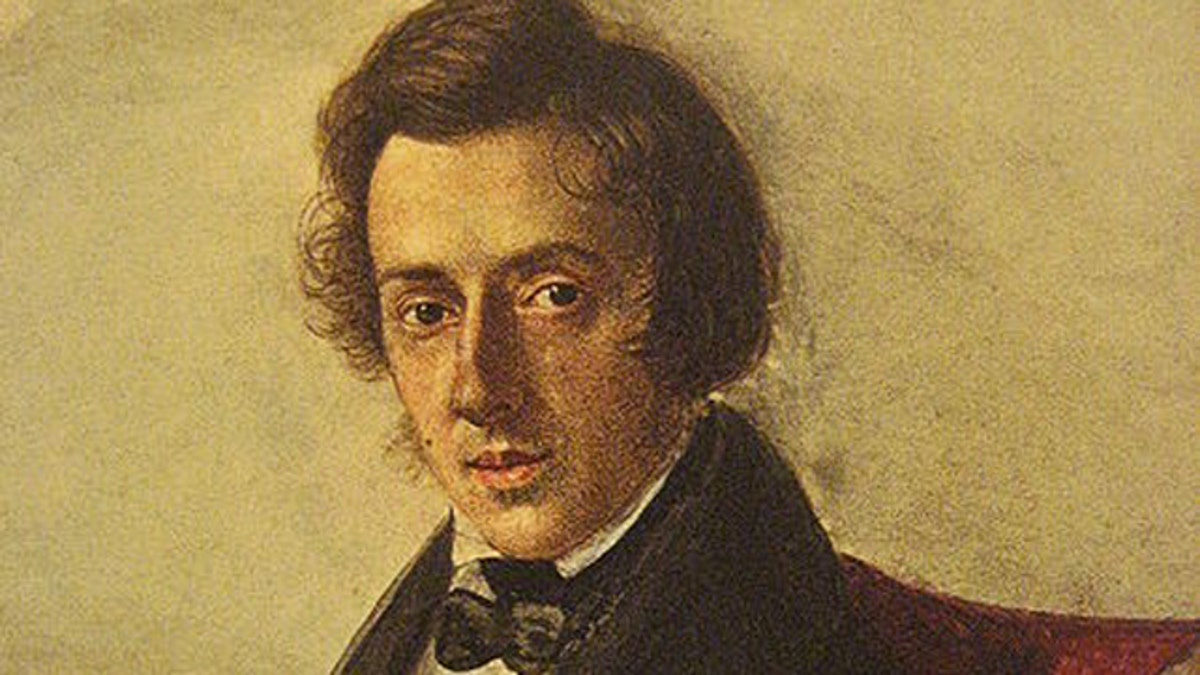
This is an 1835 watercolor portrait of Polish composer Frederic Chopin, painted by then-16-year-old Maria Wodzinska (1819-96).
Recently, the internet has been inundated with talk of an article in a publication called Medical Humanities titled, “The Hallucinations of Frédéric Chopin.”
Two Spanish doctors state that the great Polish composer, Frédéric Chopin, was probably an epileptic, suffering from a disease called “temporal lobe epilepsy.” This new diagnosis happens to be only one of various reasons put forth by some in the medical profession as the cause for Chopin’s fragile health as well as his death in 1849 at the age of 39. Some of the others were: tuberculosis; alpha 1-atitrpsian deficiency resulting in liver failure; mitral stenosis, a heart valve obstruction; and, most recently, cystic fibrosis, a disease affecting the lungs and digestive tract. As there is no proof to verify any of them, they must all be viewed as pure conjecture – his autopsy report was lost, so its findings will never be known.
An unknown letter from Chopin to Solange, his lover George Sand’s daughter, seems to be a central theme used by these Spanish doctors to buttress their diagnosis of epilepsy. In this letter owned by the French music critic Bernard Gavoty, Chopin walks away from the piano in the middle of a performance because he saw strange creatures emerging from the piano. The validity of that letter still remains in doubt. The Daily Telegraph in London recently printed in their editorial section a letter from Lady Rose Cholmondeley who is the President of The Chopin Society in the UK. She states, “…no one apart from Gavoty ever saw it and, after his death, people looked among his effects but did not find it. There is no mention in contemporary reports of Chopin leaving the platform in such a way during the Manchester concert or any of the concerts he gave in 1848…” Having known Mr. Gavoty personally, it would be hard to question his integrity even though I never heard him speak of it.
There seems to have been no question of the authenticity of rather explicit love letters that were exchanged between Chopin and the Countess Delfina Potocka a beautiful, intellectual, artistically gifted singer. But – many years later they were proven only to be the fantasy of someone’s fertile imagination.
Could Chopin have been an epileptic as doctors Caruncho and Fernández state? That he suffered from manic depression (today known as bipolar disease) can be surmised from his letters and from his biographers as well. It is a condition that seems to affect many artists in varying degrees. Creativity seems to bring on the highs and lows that are a hallmark of manic depression and the hypersensitive Chopin’s fragile health certainly added to his depressive tendencies. In reading extensively on the subject, I was struck by the fact that hallucinations can be brought on by manic depression as well as several other psychiatric and medical disorders. A different medical condition had Chopin’s doctor prescribing sugar and opium which obviously would have exacerbated any hallucinatory tendencies he had. I also find it interesting that the Spanish doctors do point out that hallucinations can be experienced by some normal individuals when falling asleep.
George Sand speaks dramatically of their several months spent in an abandoned monastery on Majorca, a small island off the east coast of Spain. She spoke of his episodes of hallucinations and fears but it is important to know more of this story. Apparently at nighttime, an old monk of the community would wander drunkenly through the halls of the cloister “like a ghost,” pounding his staff on the floor, calling out the names of monks who were no longer there with whom he would have imaginary conversations. His pet obsession seems to have been a Padre Nicholas who was the only one he thought never replied. Having no success, the old monk could often be seen on the floor, weeping at the feet of a statue of the Madonna. I don’t think it very hard to understand that Chopin suffered recurring nightmares there!
Epilepsy alone does not cause death. Any one of the previously mentioned illnesses he might have had certainly could have been life threatening – more so in someone with Chopin’s fragile health. We now know how much strong emotion can affect a person’s immune system and the rupture of his relationship with George Sand must surely have played havoc with his emotions. His close friends did say, “He died of a broken heart.” Perhaps they were right.
Byron Janis is renowned internationally as one of the world's greatest concert pianists. In 1988, he was honored by President Reagan at a State Dinner at the White House marking the 40th anniversary of his highly acclaimed debut at Carnegie Hall that launched his brilliant career. In 1973, he developed psoriatic arthritis in both hands and wrists yet he continued his performing career and even made two highly acclaimed CDs. In 1986, he became a spokesperson for the Arthritis Foundation as its National Ambassador to the Arts. He lives with his wife, Maria Cooper Janis, in New York City and recently completed his autobiography.








































